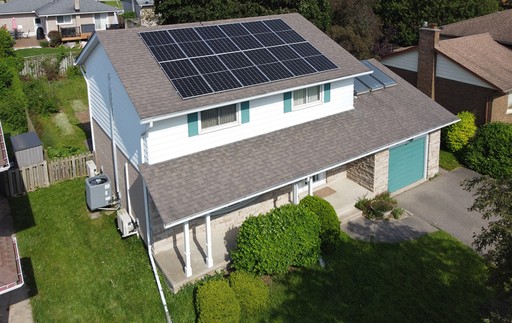Back to Index
Batteries can play an important role in solar energy systems, but they are not necessary for most users. Homes with solar panels do not require a battery when they are connected to the grid.
During the day, solar panels generate electricity, and any excess energy is typically sent back to the grid, often resulting in energy credits that reduce your electricity bill (Check out Net Metering). At night or during times when solar generation is low, homes can draw power from the grid as needed.
However, if you are someone who wants to ensure your home has power during a grid outage, a battery back-up system is essential. Even with a solar array installed, your home will not be able to function during a power outage unless you have a battery. This is primarily for safety reasons, as grid-tied solar systems are designed to shut down during outages to protect utility workers from electrical current while they work on restoring power.
A battery system allows you to store the excess energy generated by your solar panels during the day and use it when needed, such as at night or during an outage. Here are a few key reasons why a battery might be a good fit for your household:
Power During Outages: In areas that experience frequent or prolonged power outages, having a battery back-up ensures that essential appliances like refrigerators, heating systems, or medical devices can continue to function even when the grid is down. Without a battery, your solar system alone cannot keep your home powered in these situations.
Energy Storage: Batteries allow you to capture and store solar energy that is not immediately used. This is especially useful for households that consume more energy in the evenings or during the night, as they can rely on the stored energy instead of drawing from the grid during these times.
Energy Independence: For those looking to reduce their reliance on the grid and take more control of their energy usage, a battery offers a higher degree of energy independence. By storing the energy your solar panels produce, you can limit the amount of electricity you need to purchase from the grid, even during times when solar generation is low.
Load Shifting: Load shifting is when a system takes advantage of time-of-use electricity pricing. The system will charge the battery when electricity is cheaper (during off-peak times) and discharge it during peak periods when electricity prices are higher. Check with your local distribution company (LDC) for their specific guidelines regarding load shifting especially if considering exporting the energy back to the grid during peak hours.
Sustainability: For those committed to sustainability, a battery helps maximize the efficiency of a solar system. Rather than sending all excess energy back to the grid, it can be stored for later use, ensuring that more of the energy you produce is used directly by your home, further reducing your carbon footprint.
Clipped Energy: Clipped energy occurs when solar panels are generating more than the capacity of the inverter. At these times a battery can absorb the excess energy that would otherwise be lost.
While batteries are not necessary for every solar installation, they can provide valuable peace of mind for homeowners concerned about grid reliability and energy costs. For those looking to make the most of their solar system, a battery back-up can enhance functionality, ensuring that you always have power when you need it most.

Residential Systems
What components are needed for a residential system?

Net Metering
Learn how net metering works and how it can save up to 90% from your energy bill.

What level of service or maintenance is required with solar installations?

What is the impact of solar panels on the environment.

Commercial Systems
What to expect when installing a commercial system.

Agricultural Systems
What do you need to consider before choosing a solar company for the farm?

Battery Backup
Should I get a solar battery for my home? Decide if the battery option is right for you.


